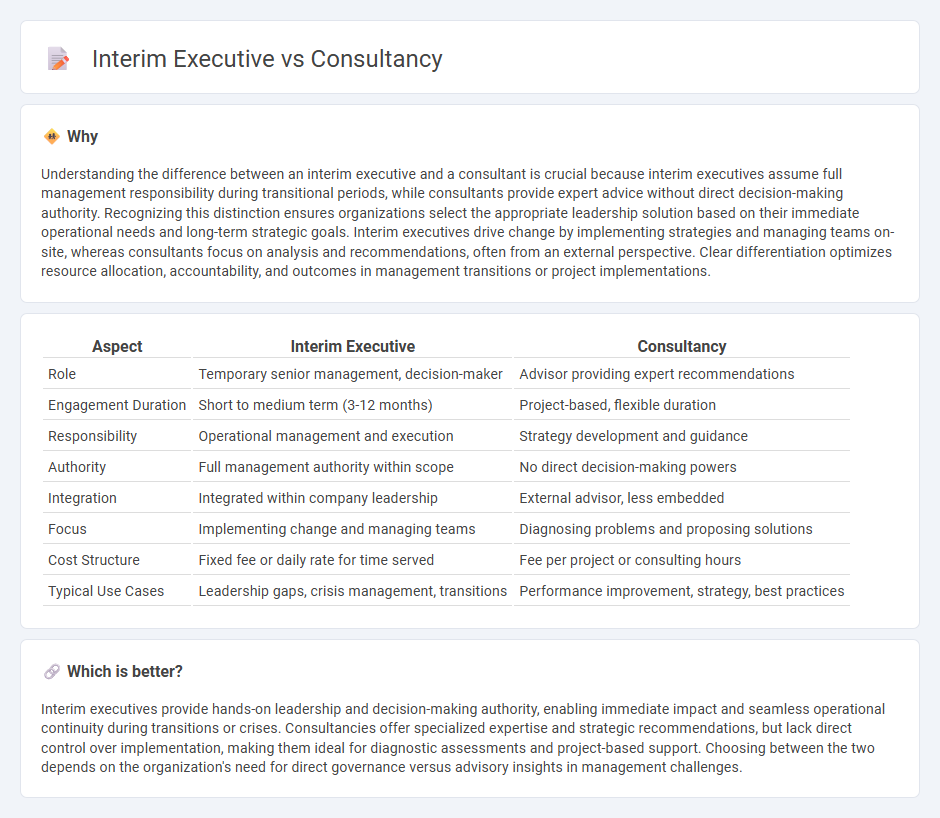
Interim executives provide hands-on leadership by temporarily filling key management roles within an organization, ensuring continuity and operational stability during transitional periods. Consultancy offers expert advice and strategic recommendations without direct management involvement, focusing on problem-solving and process improvement. Explore the differences between interim executives and consultants to determine the best fit for your business needs.
Why it is important
Understanding the difference between an interim executive and a consultant is crucial because interim executives assume full management responsibility during transitional periods, while consultants provide expert advice without direct decision-making authority. Recognizing this distinction ensures organizations select the appropriate leadership solution based on their immediate operational needs and long-term strategic goals. Interim executives drive change by implementing strategies and managing teams on-site, whereas consultants focus on analysis and recommendations, often from an external perspective. Clear differentiation optimizes resource allocation, accountability, and outcomes in management transitions or project implementations.
Comparison Table
| Aspect | Interim Executive | Consultancy |
|---|---|---|
| Role | Temporary senior management, decision-maker | Advisor providing expert recommendations |
| Engagement Duration | Short to medium term (3-12 months) | Project-based, flexible duration |
| Responsibility | Operational management and execution | Strategy development and guidance |
| Authority | Full management authority within scope | No direct decision-making powers |
| Integration | Integrated within company leadership | External advisor, less embedded |
| Focus | Implementing change and managing teams | Diagnosing problems and proposing solutions |
| Cost Structure | Fixed fee or daily rate for time served | Fee per project or consulting hours |
| Typical Use Cases | Leadership gaps, crisis management, transitions | Performance improvement, strategy, best practices |
Which is better?
Interim executives provide hands-on leadership and decision-making authority, enabling immediate impact and seamless operational continuity during transitions or crises. Consultancies offer specialized expertise and strategic recommendations, but lack direct control over implementation, making them ideal for diagnostic assessments and project-based support. Choosing between the two depends on the organization's need for direct governance versus advisory insights in management challenges.
Connection
Interim executives provide temporary leadership during organizational transitions, bringing expertise that aligns with consultancy services focused on strategy development and operational improvements. Both roles emphasize delivering targeted solutions to address immediate business challenges and facilitate long-term growth. This connection ensures seamless knowledge transfer and executive decision-making through adaptive, project-based leadership.
Key Terms
Advisory
Consultancy primarily provides strategic advice and tailored recommendations to solve complex business challenges, leveraging deep industry expertise without assuming operational roles. Interim executives, while also offering advisory input, take on temporary leadership positions to implement strategies and drive immediate results within the organization. Explore more to understand which approach best suits your leadership needs and business goals.
Implementation
Consultancy provides expert advice and strategic recommendations to organizations, while interim executives take on temporary leadership roles to directly implement and manage change. Interim executives drive execution by making decisions, leading teams, and ensuring alignment on business objectives within a defined timeframe. Discover how leveraging both can optimize your organization's transformation strategies.
Temporary Leadership
Temporary leadership bridges the gap between consultancy and interim executive roles by providing hands-on management during critical phases. Interim executives take charge with full decision-making authority to drive strategic initiatives, while consultants primarily advise based on expertise without direct operational control. Explore the nuances of temporary leadership to determine which solution best fits your organization's immediate needs.
Source and External Links
What is consulting? - This webpage defines consulting as the provision of independent, specialist advice and/or implementation support across industries, often focusing on business strategy and operations.
What is consulting? - This article explains consulting as providing expertise on various matters in exchange for a fee, commonly associated with business advisory services.
What Is Consulting & What Do Consultants Do? - This webpage explores consulting through the lens of management consulting, where consultants act as problem-solvers for businesses, addressing issues like strategy and operations.
 dowidth.com
dowidth.com